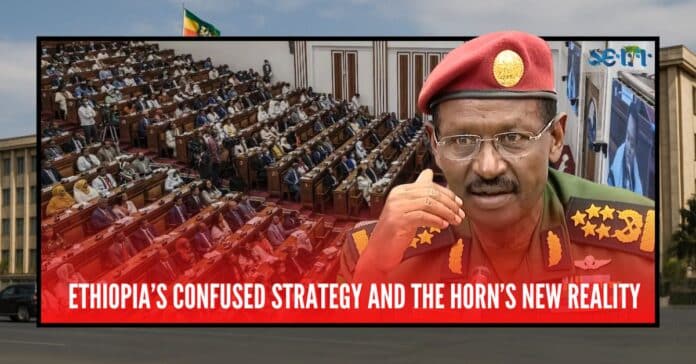In a recent and surprising development, Ethiopia’s Chief of Staff appeared before Parliament not to brief lawmakers on national security, as is customary, but to deliver a lengthy address on diplomacy and regional affairs—topics traditionally handled by the civilian leadership. This breach of protocol raises a fundamental question: Why is a top military official addressing foreign policy in such a political forum?
This unusual intervention reveals a deeper confusion within the Ethiopian government—particularly concerning its increasingly belligerent rhetoric about acquiring a seaport “by any means necessary”—most notably one belonging to the sovereign state of Eritrea. Officials have repeatedly referred to this ambition as an “existential issue,” prompting another critical question: How can claiming the territory of a neighboring, independent state be framed as essential to national survival?
That remains a million-dollar question.
What further compounds the confusion is the glaring incoherence among Ethiopia’s top officials themselves. Just days earlier, Ethiopia’s Foreign Minister, speaking before the same Parliament, sought to downplay tensions by insisting that the country was not engaged in any “war of words” with Eritrea. He claimed that inflammatory remarks made by previous Ethiopian leaders were merely personal views that did not reflect the government’s official position. His statement was in response to a lawmaker’s question concerning the rising tensions between the two governments.
Yet this reassurance was short-lived and profoundly unconvincing. The Defense Minister had already appeared on state-run media, accusing Eritrea of various provocations and declaring that Ethiopia had built a powerful army to counter regional threats—a statement clearly aimed at Eritrea and its neighbors. She went so far as to claim that all inhabitants of Eritrea’s coastal areas are Afars and that all Afars consider themselves proud Ethiopians—a statement that triggered an angry backlash from Eritrean Afars.
The truth is starkly different: not all Eritrean coastal areas are inhabited by Afars, and Eritrean Afars are not Ethiopian, nor do they consider themselves so. The Defense Minister may not know it, but in Eritrea’s Dankalia region—home to the majority of Eritrean Afars—over 99% voted for independence in the 1993 referendum, just like the rest of the country. Her assertion is not only factually false but deeply offensive to a proud community that fought for, and continues to defend, Eritrea’s sovereignty.
The contradiction becomes even more glaring when Prime Minister Abiy Ahmed himself is repeatedly heard making statements that can only be described as beating the drums of war. These remarks leave little room for ambiguity about Ethiopia’s ambitions. Moreover, state media has consistently echoed this aggressive posture, elevating the narrative of Ethiopia’s “historic and legal right” to a seaport into what now resembles a national campaign.
Far from being isolated or personal opinions, these statements reflect a coordinated and deliberate narrative—rendering the Foreign Minister’s comments either disingenuous or dangerously out of step with reality.
Taken together, these contradictions suggest that Prime Minister Abiy Ahmed has not broken with the mindset of his predecessors, who long fantasized about turning Ethiopia into a coastal power—even if it meant perpetual conflict. This obsession has resurfaced as a strategic priority, casting a dangerous shadow over the Horn of Africa and undermining international law, which firmly upholds the sovereignty and territorial integrity of all states.
Paradoxically, the Field Marshal’s blunt remarks may prove to be a blessing in disguise. For Eritreans and other peoples of the Horn, his statements confirm what many have long suspected: the much-celebrated 2018 peace agreement between Ethiopia and Eritrea was not based on genuine reconciliation. Rather, it was a tactical pause—meant to secure Eritrea’s military support during Ethiopia’s war with the TPLF. Now that the threat has subsided, Ethiopia appears to have reverted to its expansionist ambitions.
Eritreans, who extended a hand of friendship and stood by Ethiopia in its moment of crisis, now feel deeply betrayed. The peace deal was expected to close a painful chapter and usher in a new era. But the Chief of Staff’s remarks—and those of others—make it clear: Ethiopia never truly abandoned its desire to claim Assab and other Eritrean assets. It merely postponed that ambition.
This betrayal—so openly expressed by Ethiopia’s military leadership and echoed across its political and media establishments—underscores a sobering reality: peace that is not built on mutual respect, lawful recognition of borders, and a shared commitment to regional stability is doomed to collapse.
The peoples of the Horn must now respond with greater vigilance, unity, and strategic coordination. As the Ethiopian government drifts toward another reckless path, the international community must reaffirm its commitment to sovereignty, non-aggression, and the core principles of international law—before this dangerous confusion pulls the region into yet another tragic chapter of conflict.

